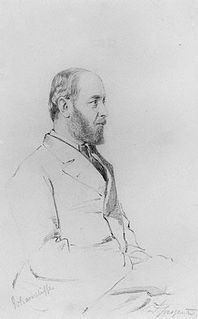Related Research Articles

Earl of Home is a title in the Peerage of Scotland. It was created in 1605 for Alexander Home of that Ilk, 6th Lord Home. The Earl of Home holds, among others, the subsidiary titles of Lord Home, and Lord Dunglass (1605), in the Peerage of Scotland; and Baron Douglas, of Douglas in the County of Lanark (1875) in the Peerage of the United Kingdom. Various Earls of Home have also claimed the title of Lord Hume of Berwick. The Earl is also Chief of the Name and Arms of Home and heir general to the House of Douglas. The title Lord Dunglass is the courtesy title of the eldest son of the Earl.

William de Berkeley, 1st Marquess of Berkeley was an English peer, given the epithet "The Waste-All" by the family biographer and steward John Smyth of Nibley. He was buried at "St. Augustine's Friars, London" according to one source, but most likely in the Berkeley family foundation of St Augustine's Abbey, Bristol.
Charles Cospatrick Archibald Douglas-Home, 13th Earl of Home,, styled Lord Dunglass between 1881 and 1918, was a British peer and banker. He served as Lord Lieutenant of Berwickshire from 1930 to 1951. He was the father of British prime minister, Sir Alec Douglas-Home.

Charles Alexander Douglas-Home, 12th Earl of Home,, styled Lord Dunglass between 1841 and 1881, was a British politician and nobleman. He served as Lord Lieutenant of Berwickshire from 1879 to 1880 and Lord Lieutenant of Lanarkshire from 1890 to 1915.

Ronald Collet Norman JP was a banker, administrator and politician. He was chairman of the Board of Governors of the BBC from 1935 to 1939 and of the London County Council from 1918 to 1919.

Clan Douglas is an ancient clan or noble house from the Scottish Lowlands.

Charles Compton Cavendish, 1st Baron Chesham was a British Liberal politician.
William George Cavendish, 2nd Baron Chesham was a British Liberal politician.

Sir Charles Dormer of Wing, 3rd Baronet, 2nd Earl of Carnarvon, 2nd Viscount Ascott, 3rd Baron Dormer of Winge was an English peer. On his father's death at the First Battle of Newbury, on 20 September 1643, he succeeded to his father's titles, at just 10 years of age. His mother had died in June, a few months earlier. He married twice, had four children, but his only son predeceased him and so when he died in 1709 the earldom and the viscountcy became extinct. The baronetcy and barony were inherited by Rowland Dormer, 4th Baron Dormer, a grandson of the second son of the 1st Baron Dormer.

William Ernest Duncombe, 1st Earl of Feversham, known as The Lord Feversham between 1867 and 1868, was a British Conservative politician.

Alexander David Frederick Lloyd, 2nd Baron Lloyd, was a British Conservative politician.

Alan Legge Gardner, 3rd Baron Gardner, was a British Whig politician.

Frederick William Brook Thellusson, 5th Baron Rendlesham, was a British Conservative politician.

John Walter Edward Douglas-Scott-Montagu, 2nd Baron Montagu of Beaulieu, was a British Conservative politician and promoter of motoring. He is the father of Edward Douglas-Scott-Montagu, 3rd Baron Montagu of Beaulieu who would go on to found the National Motor Museum, Beaulieu in Montagu's memory.

Edward Montagu Stuart Granville Montagu-Stuart-Wortley-Mackenzie, 1st Earl of Wharncliffe, was a British peer and railway executive.

Admiral William Alexander Baillie-Hamilton was a Scottish naval commander who served on the Arctic Council when it was searching for Sir John Franklin.
Archibald James Edward Douglas, 1st Baron Douglas, was a Scottish politician.

Cospatrick Alexander Douglas-Home, 11th Earl of Home, styled Lord Dunglass until 1841, was a Scottish diplomat and politician. He served as a representative peer for Scotland. During the premiership of the Duke of Wellington, he served as Under-Secretary of State for Foreign Affairs from 1828 to 1830.

Elizabeth Scott, Duchess of Buccleuch, formerly Lady Elizabeth Montagu, was the wife of Henry Scott, 3rd Duke of Buccleuch.
Henry James Montagu-Scott, 2nd Baron Montagu of Boughton
References
- leighrayment.com [Usurped!]
- Lundy, Darryl. "p. 10965 § 109642". The Peerage.[ unreliable source ]
- Lundy, Darryl. "p. 1081 § 10808". The Peerage.[ unreliable source ]